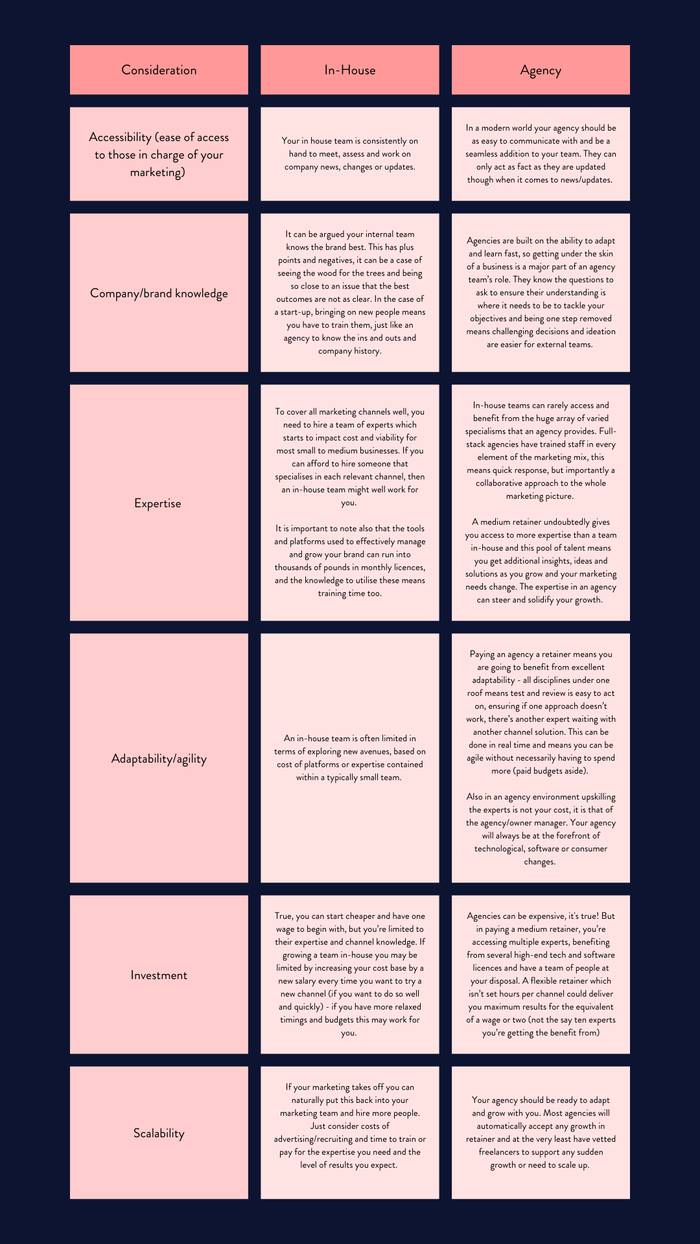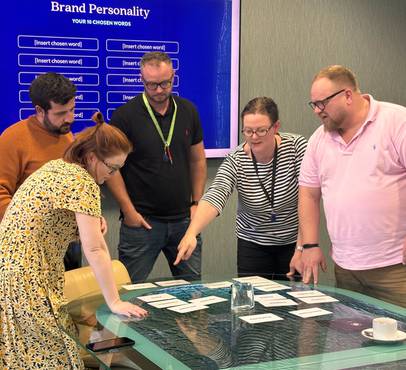New Year always sparks the great budget debate, ahead of April’s year end, so it’s a time where lots of questions about how best to maximise marketing budgets for the coming months.
When marketing a brand you have two options, you can hire and build your own in-house team, or you can consult and retain a marketing agency to promote your business to your audiences. There are multiple considerations from cost and efficiency, to expertise, scalability and ROI, so we’ve put together a look at all the options to help you spend your all-important pennies more wisely.
What is the role of an in-house marketing team?
An in-house team means you assume all responsibility for your business and its own marketing by hiring and building a team according to the marketing channels you’re keen to exploit for your brand. This team will have responsibility for awareness building, customer retention/engagement and more.
What is the role of a marketing agency?
When you engage a marketing agency for your brand, you’re outsourcing all or part of the marketing responsibility to a third party - usually consisting of varied experts in multiple channels (excludes specialist agencies that may focus on one channel - but we’re focusing on full-stack or full-service agencies). For start-ups and small businesses, having access to multiple channels for a fee can be quicker and more efficient than growing a team internally - more on this later.
The quick look at in-house vs. agency
In-house vs. agency marketing on investment/cost
Cost is an essential consideration when choosing in-house vs. agency for your marketing; in fact, it may well be the biggest factor. While some agency costs may seem high, the important thing to consider is how far your money goes in each scenario and how that delivers in the medium to long-term, to truly understand what is best for your business. As ever, there is a case for both sides, determined by your objectives, goals and budget.
There is a common misconception that businesses can successfully achieve that which a full-service agency provides by hiring one person to cover multiple disciplines, and while some degree of success may be possible this way, it grossly underestimates the skill, expertise and knowledge required to effectively manage every channel. So, not only is it a vastly challenging task for the person you hire to handle social, PPC, SEO and PR, but realistically, if you pay one wage, but expect the work of four people, your results, your success and that person’s sanity will be at risk!
If you’re committed to doing a job well and have identified multiple channels as key to your strategy, then it will inevitably cost you more to hire the right people internally. If you pay four or five experts, your initial recruitment and your wage bill, per month, will be significant. If you hire an agency you benefit from the flexibility of a strategy which can change month on month to include other/newer, or previously irrelevant channels as your needs grow and retainers can start at the equivalent of one wage per month. The cost is beneficial, but importantly, you are not compromising on the expertise or understanding of your team and their ability to meet diverse or changing needs as your business grows.
Beyond the wage costs of hiring a team of experts, you need to factor in what it costs to run and stay abreast of the digital marketing world. Most agencies will bring to you, as a client, the benefit of varied licences for tech, software and platforms that elevate your marketing efforts, track its success and ensure you can stay ahead of competitors. These can range from just a few pounds a month, into tens of thousands and quickly become a significant addition to your outgoings.
In-house vs. agency marketing on company knowledge
If you have an established in-house team, it’s possible you can mobilise them to start on a project or campaign using their existing knowledge of the brand. We all know that understanding a brand vision, mission, objectives and audience(s) are crucial elements to achieving success, so people who know the brand well are always an asset. However, if your team is new or inexperienced, you still have to invest time in getting them up-to-speed. This is where an agency can shine; not only does an agency have endless practice in quickly and efficiently getting under the skin of a brand, they also have varied viewpoints, skills and expertise to help achieve the aims you’ve set out, so don’t see bringing an agency on board as blocker to moving quickly - these teams are designed to do this, fast! Not only that, but a lot of the preliminary ‘getting to know you’ is done very early on and usually pre-proposal, so by the time you sign an agency they’ve pulled together everything they need to meet your aims and objectives. Agencies will also always see working with your brand advocates and specialists as a major plus point- collaboration is always a good idea.
In-house vs. agency marketing on expertise
Whether you’re hiring people with on the job expertise, relevant degrees and qualifications or a combination of the above - marketing expertise is something that is crucial - very few people get ahead in such a competitive market without the appropriate expertise. With an in-house team you can find equally talented and knowledgeable professionals, that’s for sure, but one person’s expertise is limited to their experience and or the time they can invest in learning - which is where in-house teams often fall behind. One or two people are likely not to have had direct experience with all elements of the marketing mix.
An in-house team is the right solution for you if you hire someone with the skills you need and you’re seeking perhaps one or two overlapping channels, of which they have experience. If you’re hoping to cover the full marketing mix, you would benefit more from the diversity of a full-service team.
Agencies are built on shared and extensive knowledge. Ten, fifteen, twenty years’ expertise quickly mounts up into a hotbed of agile solution development, creative ideas and it’s this which often sets them apart.
It’s important to note though, that in-house teams and agencies are not mutually exclusive, and in fact, it can be a perfect solution to use agency support to balance out the gaps and discrepancies in knowledge and skill sets.
In-house vs. agency on scalability
Growing a retainer is always going to be quicker and more cost effective than hiring more people - there, we said it. It is clear that an agency can adapt to success or sudden need to grow marketing activities much quicker than an in-house team. Many in-house teams are already stretched as they’re covering the specialisms of multiple marketers, so when something new lands that’s either a new channel or avenue, or requires significant time investment, it can be hard for them to meet that demand without compromise on quality somewhere else. For a seamless expansion of activity, the people handling your marketing at an agency can usually pretty immediately make recommendations on what steps to take to capitalise on success, bringing more experts into the project team as they do so/as required.
In-house vs. agency on agility
Again, if you have an established in-house team and huge budgets then this whole debate isn’t for you and you’re likely to be doing just fine, but if you’re on the fence then this is another vote for agencies.
Collective skill sets, money for licences and the tech needed to stay abreast of a fast-paced digital world mean that in most cases an agency can pip in-house to the post to be more agile, forward-thinking and adaptable to specific changes, directives or a change in approach.
In-house vs. agency marketing on accessibility
Getting things actioned quickly and efficiently can be decided between a campaign’s success or failure. With this in mind, there’s a lot to be said about who will come out on top in an in-house vs. agency scenario.
In-house has the upper hand on paper - because if something happens within an organisation that requires a change in approach, or if something sensitive hits and something needs pulling from a schedule, it would make sense to assume getting that message out within your own organisation will be quicker. This may be so, but was much more likely to be an issue before the dawn of digital.
We’re so connected now that a good agency should act - and feel - like an extension of your team, and as such should be able to act just as fast. It’s also important to note that the varied experiences of a broader agency team means responding to anything challenging, damaging to your brand or generally sensitive, is likely to be managed in a more effective way with consideration for all relevant outcomes.
What is best? In-house or agency?
It can be a hard choice especially for smaller or start-up businesses to make, but the fact remains, agencies are adaptable, (usually) have a more diverse and developed range of skill sets than it would be possible for a new business to afford to build.
If you’re looking for support on your terms, that doesn’t compromise on output then an agency is the way to go; access multiple channel experts, benefit from all the software, tech and licences you need, switch channels with ease based on consumer behaviours and enjoy results that can easily be pivoted as you see fit.
Yes we’re biased, but we’re also used to helping businesses and their in-house teams for all of the above reasons, so whether through collaboration and support, or in silo, an agency like Extreme can help elevate your brand without compromise.
Ready to get started and level up your marketing?
Get in touch with our team of expertsPost by

Amy joined in 2014 to set up our Content department. She now heads up a growing Brand and Content team, utilising over 13 years’ experience to deliver brand awareness through targeted, multi-channel copy. As well as engaging content for websites and blogs, Amy delivers PR strategies and tone of voice exploration, helping clients to communicate the purpose and values of their brand with maximum impact.
Project




